|
|
|
Sort Order |
|
|
|
Items / Page
|
|
|
|
|
|
|
| Srl | Item |
| 1 |
ID:
130201
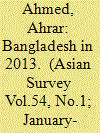

|
|
|
|
|
| Publication |
2014.
|
| Summary/Abstract |
Bangladesh in 2013 exhibited intense political polarization that was both frustrating and ominous. Several factors exacerbated political tensions in the country including the war crimes trial and disagreements relating to the caretaker government. Judgments and rulings by the courts also fed the forces of political turmoil. The economic situation was relatively good but faced increasingly difficult challenges. In terms of international relations, particularly with India and the U.S., the year was unproductive.
|
|
|
|
|
|
|
|
|
|
|
|
|
|
|
|
| 2 |
ID:
165981
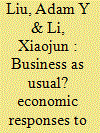

|
|
|
|
|
| Summary/Abstract |
What is the relationship between political tensions and economic relations? In this study, we explore this question by examining how Japan’s nationalization of the Diaoyu/Senkaku Islands, a territory much disputed with China, has affected bilateral trade between the world’s second and third largest economies. Using monthly data, we find that the nationalization imbroglio has negatively affected the amount of goods Japan exports to China, with the effect being most pronounced for highly salient and visible products such as automobiles and cameras; these experienced immediate and dramatic drops lasting up to 12 months. In contrast, raw materials and intermediate goods were not affected at all; some even experienced increased exports. These findings suggest that consumer and corporate responses to political tensions may follow different logics. For consumers, certain political tensions, especially those involving enduring territorial disputes, could override entrenched economic interests and preferences, at least in the short term. In these instances, it will no longer be business as usual.
|
|
|
|
|
|
|
|
|
|
|
|
|
|
|
|
| 3 |
ID:
141522
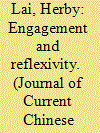

|
|
|
|
|
| Summary/Abstract |
Amidst political tensions between China and Japan, and against the backdrop of the patriotic education campaign in China that promotes a negative image of Japan as the victimiser, Chinese students in Japanese educational institutions study and work in Japan in a highly politicised context. In general, how they chose to interpret their experiences in Japan, and their views on history and controversial political issues involving China and Japan, demonstrates two levels of cosmopolitanism – namely, the ability and the willingness to engage with Japanese people on such issues, and reflexivity towards their own national identities. Meanwhile, some informants would deliberately avoid talking about history and controversial political issues involving China and Japan. While they lacked the willingness to engage with Japanese people on controversial issues, their keenness to separate their daily lives in Japan from the political context means they were also engaged in a reflexive reconfiguration of their national identities.
|
|
|
|
|
|
|
|
|
|
|
|
|
|
|
|
| 4 |
ID:
170088
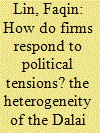

|
|
|
|
|
| Summary/Abstract |
Little is known about the firm-level dynamics behind trade responses to political tensions. This article reinvestigates variation in the travel pattern of the 14th Dalai Lama to study how political tensions affect trading decisions of Chinese importers. Using monthly trade data from China Customs covering imports of machinery and transport equipment from 173 countries over the 2000–2006 period, our empirical results show a significant reduction of imports in response to foreign government members' meetings with the Dalai Lama. In line with the idea that Chinese importers face a trade-off between bearing costs from suboptimal trade transactions and costs from not accommodating the government, this ‘Dalai Lama Effect’ operates at the intensive margin, i.e., via a decrease in the import volume per importer. Examining differential effects across types of firm ownership, we find that the observed effect is driven by state-owned enterprises (and foreign-invested firms) and not by private companies. Moreover, while direct importers temporarily reduce their trade with Dalai Lama-receiving countries, there is some evidence that trade intermediaries fill the void. Overall, we find the effects to be much more short-lived than previously thought.
|
|
|
|
|
|
|
|
|
|
|
|
|
|
|
|
| 5 |
ID:
123014
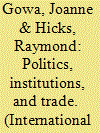

|
|
|
|
|
| Publication |
2013.
|
| Summary/Abstract |
Recent studies cast doubt on the value added of international trade agreements and institutions. Using a new data set that consists of about 35,000 observations on the trade of fifty-four nations between 1919 and 1938, we examine whether this skepticism also applies to the infamous interwar trade blocs. Traditional historical accounts attribute to them a large drop in international trade and a rise in the political tensions that would later erupt in World War II. In this study, we show that no bloc raised trade among its members as a whole or decreased trade between members and nonmembers. However, our findings are not wholly consistent with the skepticism recent studies express. We argue that conflicts of interest among the great powers encouraged the emergence of the bloc system and also gave rise to intrabloc trade shifts consistent with the political interests of their great-power hubs. The political-military alliances these conflicts created also reduced trade between their signatories, and we argue more generally that the causal chain runs from politics to trade. As a result, measuring only the effect of agreements and institutions on aggregate trade between their members can generate inaccurate estimates of their value added.
|
|
|
|
|
|
|
|
|
|
|
|
|
|
|
|
| 6 |
ID:
129072
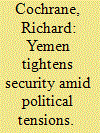

|
|
|
|
|
|
|
|